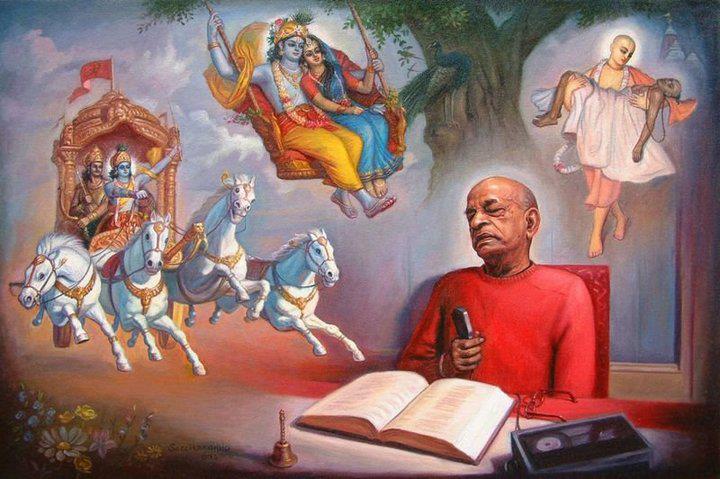Question: Çré Brahma-saàhitä 5.32 states: aìgäni yasya sakalendriya-våtti-manti
“Each of the limbs of that transcendental figure possesses in Himself, the full-fledged functions of all the organs.”
Is the same also true for liberated jivas?
Answer by Romapada Swami:
Yes. Here it is confirmed:
“The Brahma-saṁhitā confirms that the spiritual body of the Supreme Lord is so powerful that any part of His body can perform the functions of any other part. We can touch only with our hands or skin, but Kṛṣṇa can touch just by glancing. We can see only with our eyes; we cannot touch or smell with them. Kṛṣṇa, however, can smell and also eat with His eyes. When food is offered to Kṛṣṇa, we do not see Him eating, but He eats simply by glancing at the food. We cannot imagine how things work in the spiritual world, where everything is spiritual. It is not that Kṛṣṇa does not eat or that we imagine that He eats; He actually eats, but His eating is different from ours. Our eating process will be similar to His when we are completely on the spiritual platform. On that platform, every part of the body can act on behalf of any other part.”
Teachings of Lord Caitanya, Introduction
CONFIRMED BY SRILA JIVA GOSWAMI:
ādatte hari-hastena
hari-dṛṣṭyaiva paśyati
gacchati hari-pādābhyāṁ
muktasyaiṣā sthitir bhavet
Translation: “The soul that has attained sāyujya-mukti doesn’t actually merge in Brahman. It accepts things through Hari’s hands, sees through Hari’s eyes, and walks through Hari’s feet. Such is the situation of the sāyujya liberated jīva [it enjoys through the senses of Hari].” (Verse from Brahma-sūtra-bhāṣya of Madhvācārya, Quoted in Prīti-sandarbha)
The situation of those who attain the other four types of liberation is even better, because they get their own body and senses to enjoy with Hari. One of those types of liberation is sārṣṭi (having the same opulence as Bhagavān). Thus, possessing interchangeable senses is definitely seen in such jīvas. In this way, the liberated souls also enjoy all of the Lord’s opulence, such as interchangeable senses.
For example:
vividha adbhuta bhäñä-vit = “Kåñëa is the linguist of all wonderful languages.” – Cc Madhya 23.71, referenced from Bhakti-rasämåta-sindhu (2.1.23–29)
Reference: Vrindaban Days by Prof Howard Wheeler.
“Oh, Hayagriva, I have to tell you something,” Yamuna says. “I’ve told only Gurudas. I still don’t know whether to believe my eyes.”
“What’s that?”
“Well, do you remember that monkey Haladar?”
Haladar? A number of monkey faces flash through my mind. All the monkeys look pretty much the same to me, as I assume people must look to them. Having lived on the Radha Damodar roof for so long, Yamuna has become familiar with the clan of some twenty resident monkeys. In fact, she and Gurudas have had many laughs naming monkeys after the old San Francisco temple gang.
“I don’t exactly remember Haladar,” I admit.
“She’s the one with the kind of lackadaisical, slow, and shuffling personality,” Yamuna says. “She comes for prasadam like clockwork.”
That’s nothing distinctive. Living entities are like that in the holy dham—very regulated. If you throw a chapati in midair at noon, the same bird will come down at noon every day to catch it. Every day, white cows enter the front gates of Radha Damodar, circumambulate the Deities, and then walk back out, performing a parikrama you can set your watch by. One monkey comes every morning to the courtyard, sits in the mango tree with his hands folded, listens to Srila Prabhupada’s lecture, and then leaves when it’s over. One elephant is said to fast on every Ekadasi. Such activities are commonplace in Vrindaban.
“Anyway, I don’t remember her,” I say at length.
“Haladar has been accustomed to taking prasadam in my room every Tuesday and Thursday,” Yamuna says, “the same room Prabhupada’s in now. So, she came around this morning, as usual, and started swinging on the bars of the window and jabbering monkey-talk. I was standing outside the door, just about to take Srila Prabhupada some hot milk. He couldn’t see me, but I could see him sitting inside, leaning on a cushion, very relaxed, with one knee up and one knee out.”
“I get the picture,” I say.
“So … well, then—O Hayagriva, you’ll think I’m crazy.”
“Come on,” I say. “You can’t stop now.”
“Well, this is the truth, so help me. Suddenly, Srila Prabhupada started talking to Haladar in pure, unadulterated monkey-talk.”
“No!”
“Yes! It was a language, and Prabhupada spoke it in the same tone, same meter, everything. So, when Haladar heard this, she grabbed both window bars, stuck her ears out, and stared at him in amazement. Then — and I swear it! — Srila Prabhupada and Haladar had a discussion.”
“A discussion?”
“A discussion,” she repeats. “Prabhupada was so relaxed conversing in monkey-talk, and the conversation went back and forth for some time. I just stood there, afraid to move, afraid to interrupt. I thought of Lord Chaitanya talking to animals in the forest. I knew I was witnessing something unique. I even felt privileged. Then, the most amazing thing of all happened.”
“Oh?”
“After talking for some time, Haladar left. She’s never ever left before without taking prasadam. It’s completely against her monkey nature. ‘Srila Prabhupada,’ I said, ‘I don’t believe what I just saw. What went on?’ And Prabhupada replied, ‘I told her to go away and not bother me anymore.’”







